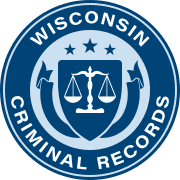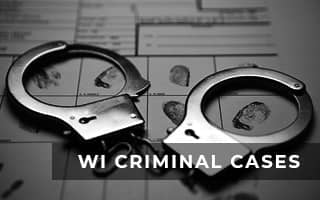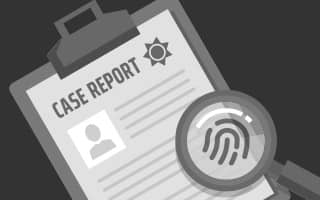Wisconsin Criminal Records Lookup
The following is for information purposes only
Table of Contents

Criminal records in Wisconsin give a complete picture of a person's history of illegal activity. Municipal, county, and state jurisdictions generated these records comprising official data regarding the detention and punishment of guilty individuals in the state.
The state's Open Records Law lets anyone view Wisconsin Criminal Records. The public can get this documentation from the Wisconsin Department of Justice (WDOJ), which keeps most of the state's criminal records.
A criminal record in Wisconsin contains the following information:
- Subject's personal information (name, date of birth, gender, race)
- Any aliases
- Mugshot
- Fingerprints
- Driver license number
- Physical descriptions
- Charges details
- Restriction orders
- Court disposition
- Current and old addresses
- Jail information
- History of arrests
- Information on probation
- Current and previous warrants
- Post-conviction status

What Are the Different Types of Wisconsin Criminal Records?

The information on a criminal record varies from place to place and depends on the crime. If you have broken the law in Wisconsin, the following could be on your criminal record.
Felonies
Wisconsin categorizes felony records into nine groups depending on the severity of the penalty for each class. Class A crimes are the worst in this state, while Class I are the least.
Class A Felonies
Treason and first-degree murder are both examples of crimes in this class. Those who commit these crimes will spend the rest of their lives in prison.
Class B Felonies
Some examples of offenses in this category are sexual assault and first-degree sexual intercourse with a child under 13. For this kind of felony, the penalty is 60 years in prison.
Class C Felonies
Class C felonies include sexual exploitation of a child, armed robbery, and causing mayhem. Whoever commits these crimes will have to pay a $100,000 fine and spend 40 years in prison.
Class D Felonies
This type of felony includes crimes like leaving the scene of an accident that killed someone and having child pornography. It comes with a fine of $100,000 and 25 years in jail.
Class E Felonies
This class includes crimes like aggravated burglary and carjacking. Those who do this must pay $50,000 and go to prison for 15 years.
Class F Felonies
Theft over $100,000 and sedition are some of the common offenses in Wisconsin under this class. Class F felonies carry a fine of $25,000 and a prison sentence of 12 and a half years.
Class G Felonies
Crimes classified as Class G felonies include illegally buying guns and negligent vehicular homicide. It has a $25,000 fine and ten years in prison.
Class H Felonies
Class H felonies include crimes like intentionally breaking a no-contact order, strangulation, and extortion. Individuals who commit these offenses will get a $10,000 fine and six years of imprisonment.
Class I Felonies
Invasion of privacy, running away from the police, and aggravated battery are all examples of this type of felony. Offenses under Class I felonies incur a $10,000 fine and three and a half years in prison.
How long does a felony remain on your record? Unless expunged, Wisconsin felonies stay on your record for life.
Misdemeanor
Like most other states, misdemeanor records are usually less severe than felonies in Wisconsin. The state law divides misdemeanor records into classes A, B, and C.
Class A Misdemeanors
The punishment for Class A misdemeanors is a fine of $10,000 and nine months in jail. If you commit any of the following offenses, you'll get this kind of record:
- Breach of a restraining order
- Battery
- Petty theft
- Fourth-degree sexual assault
Class B Misdemeanors
If someone has a Class B misdemeanor record, they will pay a $1,000 fine and spend 90 days in jail. In Wisconsin, the following are all Class B misdemeanors:
- Criminal entry into a medical facility
- Wireless or cable service theft
- Disorderly behavior
Class C Misdemeanors
Offenses falling under this misdemeanor type have a $500 fine and 30 days of imprisonment. Here are some examples of Class C misdemeanors:
- State fair park violations
- Getting drunk on public transport
- Vagrancy
How long does a misdemeanor remain on your record? In Wisconsin, a misdemeanor record will stay on your criminal history for 20 years after conviction. But the time will get shorter if you qualify for expungement in this state.
Criminal Driving Violations
Wisconsin law divides criminal driving violation records into felony traffic violations and traffic misdemeanors.
Felony Traffic Violations
In Wisconsin, this type of criminal driving record is the most severe illegal traffic violation since they frequently result in physical harm or even death. It carries a punishment of more than a year in prison.
Some examples of crimes that count as felony traffic violations in this state are:
- Reckless driving
- Hit and run that led to a death
- Leaving an accident scene
Traffic Misdemeanors
For this kind of criminal driving violation, you could go to jail for less than a year and have to pay a fine. In Wisconsin, the most common crimes under misdemeanor traffic violations are:
- Driving without a valid driver's license
- Failure to stop at a traffic light
- Driving without car insurance
- Texting or being distracted while driving
How long does a criminal driving violation remain on your record In Wisconsin? A criminal driving violation record in this state stays on a person's criminal history for five years. However, in rare cases, these records remain on file for more than five years.
Sexual Offenses
Wisconsin, like other states, penalized sexual offense records under the state's sexual assault legislation. The consequences of a sexual offense record depend on how old the subjects involved were and what kind of sexual contact they had.
Some common examples of sexual offense records in Wisconsin are:
First-degree Sexual Assault of a Minor
In Wisconsin, this sexual crime is a Class B felony with a 60-year sentence. It happens when a person of any age has sexual interaction or activity with a child under 13.
Second-degree Sexual Assault of a Minor
This sexual offense is a Class C felony, which means that the person who perpetrates it will get 40 years in jail and have to pay a $100,000 fine. Defendants of any age are guilty of this crime if they have sexual contact or activity with a child aged between 13 to 15.
Sexual Contact With a Minor 16 or Older
This kind of sexual crime is a Class A misdemeanor in Wisconsin. If someone commits this crime, they could go to jail for nine months, pay a $10,000 fine, or both. When a defendant aged 19 or older engages in sexual intercourse with a child aged 16 or 17, they commit this offense.
Sexual offenders in Wisconsin must register for 15 years or life after release.
Wisconsin has a Sex Offender Registry where interested individuals can check to search for sex offenders in the state. They can do that by name, address, and even zip code.
Although registered sex offenders in Wisconsin aren't obligated to tell neighbors directly, residents can register through the Sex Offender Registration Program (SORP) email system run by the Wisconsin Department of Corrections (WDOC).

How Do You Expunge Criminal Records in Wisconsin?

In particular situations, Wisconsin lets adults get their criminal records expunged. When a state court approves an expungement, it removes paper and electronic files.
Wisconsin law differs from most other states regarding expunging a record. In this jurisdiction, you must request expungement during sentencing. But still, the expungement only occurs once you have finished your term.
Who Is Eligible for Expungement in Wisconsin?
In general, expungement in Wisconsin is only available for certain judgments and juvenile criminal trials. You can get your record expunged in three situations:
- You committed the offense when you were under 25
- The violation entailed a maximum prison sentence of six years or less
- You fulfilled the terms of your sentence
Expungement Process in Wisconsin
The procedures and steps you must take in Wisconsin to get your record expunged vary depending on the following situations:
- The clerk will automatically expunge your record if you have completed probation or jail term. Your probation officer or prison will mail a discharge certificate to the court clerk.
- You can appeal to the court to expunge your record if you didn't go to jail or prison and weren't on probation. In this situation, you can request the court to remove your criminal history by filling out form CR-266.
- To have a juvenile record expunged, you must file a petition with the court using form JD-1780.

What Are Wisconsin Inmate Records?

In Wisconsin, inmate records are official documents that show a person's current and often past status as an inmate. These data include criminals imprisoned in correctional facilities, detention centers, and penal facilities across the state.
The WDOC keeps track of all of the state's prisoners. Anyone who wants to see these records can visit the Offender Locator portal of WDOC.
Through this portal, anyone in the system can access the status of any person who is in jail. Requesters must enter an offender's ID number or last name to get their records.
The public can also request the WDOC to get information about these people. Additionally, they can use web services run by the county sheriff's office to narrow their search to certain county jails.
The information on an inmate's record varies, but in Wisconsin, it contains the following:
- Inmate's personal information (full name, date of birth, nationality, and gender)
- Any aliases
- Booking photo
- DOC number
- Physical descriptors
- Convicted offense
- Information on the prison term
- Case number
- Maximum sentence
- Placed in charge
- Parole board date
- Sentence summary

What Are Wisconsin Arrest Records?

Wisconsin Arrest Records include details about a person's arrest history. These records show if a person got questioned, arrested, or investigated. It may also have the charges that led to the arrest.
In this state, police use arrest warrants to keep someone in custody. Following an arrest in Wisconsin, the arresting officer will transport the defendant to a local police station for booking. The booking procedure in Wisconsin includes taking a photo and fingerprints and collecting the defendant's identifying details.
Wisconsin law permits anyone to request arrest records. To access this record, interested parties should initially contact the local sheriff's office or police department authorized for the arrest.
Furthermore, requesters can obtain arrest records electronically or submit a written request to the department keeping the records. However, state agencies vary in this state, so anticipate changes in the guidelines if you acquire arrest information from several sources.
More specifically, Wisconsin Arrest Records include the following information:
- Arrestee's personal information (full name, age, birthplace, race, and sex)
- Any aliases
- Photograph
- Fingerprints
- Booking number
- Arrest date and time
- Arrest location
- Outstanding warrants
- The arresting agency
- Crime classification
- Interrogation details

How Do You Find Wisconsin Criminal Records?

In different states, there are several reasons for obtaining criminal records. In Wisconsin, however, employers request criminal records to do a background check on a possible employee.
In Wisconsin, the Crime Information Bureau (CIB) of the WDOJ makes arrest records available to anyone who wants to access them. Through the Wisconsin Online Record Check System (WORCS) website, the CIB makes public criminal records in this state.
Most employers in this state search for a person by their name instead of their fingerprints because it is cheaper and more accessible.
For a name-based criminal record search, users must create accounts and gives appropriate names, birth dates, and social security numbers. Following account acceptance, the requester may conduct a name-based criminal record search for $10 per record.
People who want a free criminal record check can also use the Wisconsin Circuit Court Access. This page requires the defendant's name and birthday for a case search.